For All Book Reviews (Robert Steele & Guest), use Reviews.
Books By and With Robert Steele (includes Amazon links and free online links). All books available for translation into any foreign language, email robert.david.steele.vivas [at] gmail [dot] com to discuss. Translations of chapters or entire books will be posted at Phi Beta Iota as they become available.
See Also: Articles & Chapters as well as Briefings & Lectures, and About Robert Steele.
KINDLE Publications can be viewed here.
2018
- 128 page PDF 31 memos
- As delivered to POTUS 8 SEP 2018
- Full text online translatable memoranda
- Full briefing by Dr. James Fetzer
- Video interview with Dr. James Fetzer
- Other online references
Memorable Short URL:
http://tinyurl.com/SH-POTUS
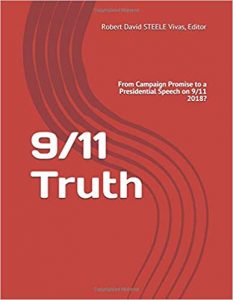 Steele, Robert. 9/11 Truth: From Campaign Promise to a Presidential Speech on 9/11 2018? (Earth Intelligence Network, 2018)
Steele, Robert. 9/11 Truth: From Campaign Promise to a Presidential Speech on 9/11 2018? (Earth Intelligence Network, 2018)
FREE at http://tinyurl.com/911-POTUS
As delivered to POTUS 8 AUG 2018
On 15 February 2016, speaking to a wildly enthusiastic crowd in Bluffton, South Carolina, he promised that he would find out — and inform the American public — “who really knocked down the World Trade Center.” As all engaged and informed citizens now know, the 9/11 Commission was a controlled cover-up at the same level of atrocity as 9/11 itself, and totally comparable to the Warren Commission controlled cover-up on the assassination of John F. Kennedy by Lyndon Baines Johnson, Allen Dulles, J. Edgard Hoover, and varied private sector participants as well as the government of Israel, which sent two witnesses to Dallas.
2017
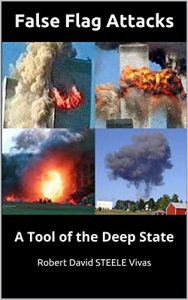
Steele, Robert. False Flag Attacks: A Tool of the Deep State (Amazon Kindle, 2017)
FREE as a Word Document
The author, a former spy who managed a false flag for the CIA (no one died) provides a mix of original and previously posted material that aggregates in one place most of what any citizen needs to know about false flag attacks as a tool of state. The next false flag attack will probably be a fake pandemic that includes the locking down of major urban areas, and the imposition of a vaccination that weakens substantial portions of the public while killing off a significant number of Alt-Right activists.
2015
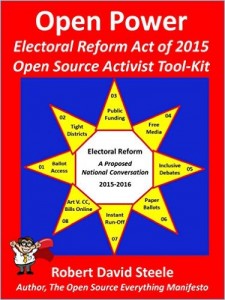 Steele, Robert (2015). Open Power: Electoral Reform Act of 2015, Open Source Activist Tool-Kit, Amazon Kindle, February 24, 2015. 216 pp. $2.99.
Steele, Robert (2015). Open Power: Electoral Reform Act of 2015, Open Source Activist Tool-Kit, Amazon Kindle, February 24, 2015. 216 pp. $2.99.
FREE Online
In this book, a cry from the heart for a free and equal America in which we put the common sense and good intentions of We the People back into governance, I offer several years of work that started with my six minute briefing to Occupy in 2011 that went viral on Reddit and YouTube. I subsequently ran briefly for President, accepted by the Reform Party, so as to create the web site We the People Reform Coalition where I put the four big transpartisan ideas down in black and white: Electoral Reform; Coalition Cabinet; Balanced Budget; and an end to the existing tax system, replacing it with Edgar Feige’s Automated Payment Transaction (APT) Tax while also enacting both full employment and a coherent population and citizenship policy.
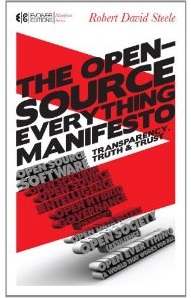
2012 What the world lacks right now—especially the United States, where every form of organization from government to banks to labor unions has betrayed the public trust—is integrity. Also lacking is public intelligence in the sense of decision-support: knowing what one needs to know in order to make honest decisions for the good of all, rather than corrupt decisions for the good of the few.
The Open-Source Everything Manifesto is a distillation of author, strategist, analyst, and reformer Robert David Steele life's work: the transition from top-down secret command and control to a world of bottom-up, consensual, collective decision-making as a means to solve the major crises facing our world today. The book is intended to be a catalyst for citizen dialog and deliberation, and for inspiring the continued evolution of a nation in which all citizens realize our shared aspiration of direct democracy—informed participatory democracy. Open-Source Everything is a cultural and philosophical concept that is essential to creating a prosperous world at peace, a world that works for one hundred percent of humanity. The future of intelligence is not secret, not federal, and not expensive. It is about transparency, truth, and trust among our local to global collective. Only “open” is scalable.
As we strive to recover from the closed world corruption and secrecy that has enabled massive fraud within governments, banks, corporations, and even non-profits and universities, this timely book is a manifesto for liberation—not just open technology, but open everything.
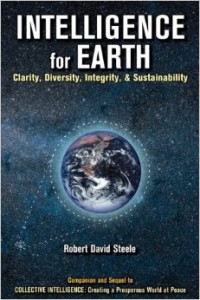
2010 A massive cultural tsunami is sweeping round the world as the five billion poor acquire Information and Communication Technologies (ICT), and the one billion rich realize that the era of Empire Rule Of, By, and For the Few is over. Happily, this is a revolution in human affairs that will be non-violent for the simple reason that no redistribution of existing wealth can match the infinite new wealth that the entrepreneurial poor can create for themselves when empowered with ICT.
We are entering an era in which global networks and the sharing of information can create revolutionary wealth at the micro-level, while enabling the harmonization of investments at the macro-level. This is an era in which transparency of cost and effect will eradicate corruption, fraud, waste, and abuse at the same time that it makes possible global to local engagement and collaboration such that we can create a prosperous world at peace. This is an era in which we will see a bottom-up conscious evolution of humanity that liberates and leverages the one inexhaustible resource we have: the human brain.
In 2004 the Secretary-General s High-Level Panel on Threats, Challenges, and Change published its findings as A more secure world: our shared responsibility. Unlike other extraordinary books this remarkable endeavor not only achieved consensus among diverse contributing Members, but actually prioritized the ten high-level threats to humanity as follows: read more at Amazon.
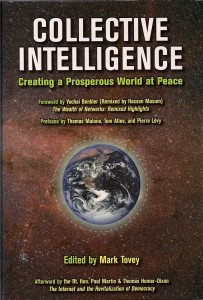
2008 The era of collective intelligence has begun in earnest. While others have written about the wisdom of crowds, an army of Davids, and smart mobs, this collection of essays for the first time brings together fifty-five pioneers in the emerging discipline of collective intelligence. They provide a base of tools for connecting people, producing high-functioning teams, collaborating at multiple scales, and encouraging effective peer-production. Emerging models are explored for digital deliberative democracy, self-governance, legislative transparency, true-cost accounting, and the ethical use of open sources and methods. Collective Intelligence is the first of a series of six books, which will also include volumes on Peace Intelligence, Commercial Intelligence, Gift Intelligence, Cultural Intelligence, and Global Intelligence. Ralph Peters: While we may think we're frightfully clever and sophisticated when it comes to our “information age,” it struck this reader that, in relation to information exploitation, we're at a point equivalent to the mid-seventeenth century in the physical sciences: We've gotten some of the basic parameters figured out, but haven't yet begun to understand their myriad applications. This volume is stimulating, useful, sometimes brilliant, and always worth turning over the page. Very highly recommended for those involved in intelligence, government or the media–as well as for citizens concerned about our collective future. Brain food for grown-ups.
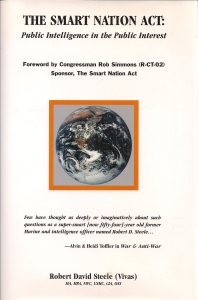
2006 Retired Reader: What is commonly forgotten is that intelligence in the CIA sense of the word is simply processed information focused on specific subjects in such a way as to provide unique knowledge of those subjects. Intelligence does not have to be classified. It usually is classified for one of three reasons:1) to protect the sources and methods by which it was produced; 2) to protect bureaucratic turf from rivals; and 3) to prevent the subject(s) of the intelligence from realizing that unauthorized persons are in possession of knowledge about them. Steele correctly maintains that classification hinders the development of real knowledge about a variety of subjects and is largely unnecessary. The core of the Smart Nation Act and Steele's primary theses is that an Open Source Intelligence Agency based on the free flow of information, the widespread use of outside experts, and the input from everyone including common citizens would provide better and cheaper intelligence than that now obtained from the existing U.S. Intelligence System. This agency would not be the typical hierarchy, but would be organized into semi-autonomous cells of researchers, analysts and experts. Each of the 50 U.S. States would have a local information processing center that would replicate the national Open Source Agency. These local centers would support state level activities requiring intelligence support and provide intelligence information from such sources as first line emergency response teams. Central to this whole concept is that the intelligence accumulated by these agencies would be available to every one so that the U.S. could actually achieve the Jeffersonian dream of an informed public.
 2006 Robert Steele: My personal view is that the key points of the book are that: 1) inter-agency sharing of non-secret information is much more important than precision delivery of secrets to the top guy; 2) unclassified information on operations, logistics, beliefs, etc. is much more important that technical secret information; and 3) there is a larger process called “Information Operations” (IO) that has been mis-defined in the US as offensive cyberwar and PSYOP on steroids, which in fact deals with a) the full and constant integration of global coverage in all languages all the time (including historical and cultural knowledge at the neighborhood level); b) the technologies of sharing, translating, and understanding; inclusive of online video gaming; and c) the crafting of inter-agency BEHAVIOR and BUDGETS (means) in order to achieve useful ends. In short, it's not about secret intelligence; it is about global awareness and ethical behavior done across all the instruments of national power, wisely. As Dr. Cambone demands, we need universal coverage, 24/7, at sub-state levels of granularity, but we also need to act on that information in a timely as well as ethical manner, utilizing all of our resources, not just our military, and harmoniously integrating our intelligence and operational activities with those of other legitimate governments and non-governmental organizations.
2006 Robert Steele: My personal view is that the key points of the book are that: 1) inter-agency sharing of non-secret information is much more important than precision delivery of secrets to the top guy; 2) unclassified information on operations, logistics, beliefs, etc. is much more important that technical secret information; and 3) there is a larger process called “Information Operations” (IO) that has been mis-defined in the US as offensive cyberwar and PSYOP on steroids, which in fact deals with a) the full and constant integration of global coverage in all languages all the time (including historical and cultural knowledge at the neighborhood level); b) the technologies of sharing, translating, and understanding; inclusive of online video gaming; and c) the crafting of inter-agency BEHAVIOR and BUDGETS (means) in order to achieve useful ends. In short, it's not about secret intelligence; it is about global awareness and ethical behavior done across all the instruments of national power, wisely. As Dr. Cambone demands, we need universal coverage, 24/7, at sub-state levels of granularity, but we also need to act on that information in a timely as well as ethical manner, utilizing all of our resources, not just our military, and harmoniously integrating our intelligence and operational activities with those of other legitimate governments and non-governmental organizations.
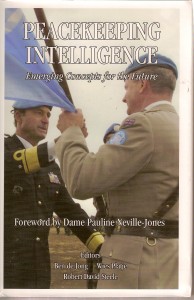
2003 Each year millions of people die, are displaced, become diseased, or suffer severe depravations at the hands of rogue states, predatory ethnic groups or tribes, or ruthless terrorist and criminal organizations. Around the globe, while recognizing the important efforts of selected Nation-States and selected Non-Governmental Organizations, only one organization can be said to be truly concerned with global security and global prosperity in the common interest of all mankind: the United Nations. Unfortunately, the United Nations has chosen to ignore the proven process of “intelligence” by confusing it with espionage. Intelligence is not about espionage, it is about rationalized decision-support in which global sources of information in many languages and many mediums (oral, written, imaged) are deliberated collected, processed, analyzed, and presented to decision-makers in order to reduce uncertainty, suggest alternatives, and otherwise make instability more manageable. This book is the first book to bring together a combination of experienced United Nations military commanders, experienced national intelligence leaders, and scholars of United Nations and insurgency history. It combines the results of the first annual conference on peacekeeping intelligence help in The Netherlands in November 2002, with eight seminal works from the past, and three vital references for the future–extracts from the Brahimi Report with intelligence-related footnotes; a completely new Peacekeeping Intelligence Leadership Digest 1.0 distilled from the entire book into 35 pages; and pointers to both the three North Atlantic Treaty Organization (NATO) doctrinal documents on Open Source Intelligence (OSINT), and to a selective group of recent references, most available online. This book is, in essence, “Ref A” for the future of intelligence at the United Nations.
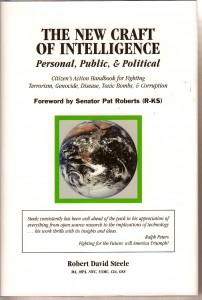
2002 This book, honored with a Foreword by Senator Pat Roberts (R-KS), at the time Chairman of the Senate Select Committee on Intelligence, is the sequel to ON INTELLIGENCE: Spies and Secrecy in an Open World (AFCEA International Press, 2000). That book, written largely for government and corporate intelligence professionals, remains the basic reference volume for the future of global intelligence enterprises. This book, by contrast, is a completely new effort that is written for every citizen of every country—the “intelligence minutemen” of the 21st Century. In the aftermath of the 11 September 2001 attacks on the World Trade Center and the Pentagon, attacks carried out by a non-state actor skilled at asymmetric warfare and using our own capabilities against us—attacks followed quickly by a nation-wide anthrax assault that closed Congress and terrified the U.S. Postal Service—it is imperative that every citizen have a clear-headed understanding of what is at stake and what needs to be done to keep not only America, but all civilized communities safe. It is especially imperative that citizens understand that the world is already at war, with millions of refugees in 67 countries, plagues sweeping across 59 countries, mass starvation in 27 countries, and deliberate genocide campaigns in 18 countries. These are “facts of life” that our schools, our media and even our intelligence communities have been unwilling and unable to represent intelligently to the public. It is against this backdrop of global chaos that terrorism rises.
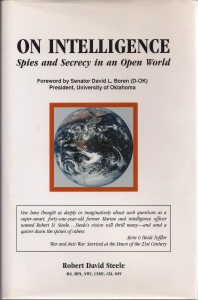
2000 This is the second edition of the book, identical in all respects to the first but with the addition of a single page detailing the six intelligence and counterintelligence failures that allowed the 9/11 attacks to occur. Honoed with a Foreword by Senator David Boren (D-OK), past Chairman of the Senate Select Committee on Intelligence, this book is about the reinvention of national, defense and business intelligence within the larger context of an open world–a world where “Evil Empires” and the Berlin Wall have fallen–but also a world where transportation, power, financial, and communications infrastructures are so open as to dramatically increase the vulnerability of America to trans-continental epidemics, anonymous information terrorism, and nation-wide power black-outs and financial melt-downs. As the world enters the Information Century, and simultaneously confronts the fragmentation of many nation-states and the emergence of widespread ethnic, tribal and criminal gang terrorism and confrontation, no topic can be more important to federal, state, and local governments–and to international, national, and local businesses than the topic of “intelligence”. Thankfully, there are many positive lessons and methods to be drawn from the U.S. Intelligence Community, and there are a wealth of open sources and services that can be drawn upon to make both government and business “smarter” about their environment, their customers, and their competitors. This book is a primer on the role of intelligence qua sources, methods, and community at the dawn of the 21st century.
See Also: Articles & Chapters as well as Briefings & Lectures, and About Robert Steele.


